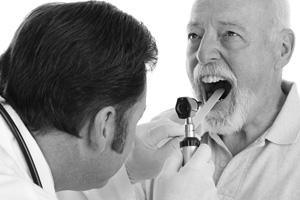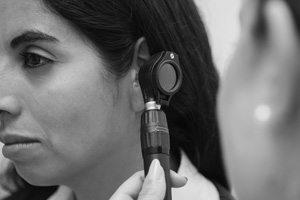View the complete list of conditions
What Are Reflux Laryngitis Problems?
Reflux laryngitis is a condition that causes stomach acid to back up into your esophagus, causing hoarseness or heartburn in some cases. Essentially, there is a muscular valve where your esophagus meets your larynx. If that isn't functioning properly, food and stomach acid can make their way back up. Patients with a hernia or increased abdominal pressure are also at higher risk for reflux laryngitis problems.
Many reflux laryngitis conditions come up while you're sleeping. Other signs and symptoms can include: post nasal drip, clearing your throat excessively, and a non-prodcutive cough. These symptoms can be indicative of things other than reflux laryngitis problems, but can contribute to the diagnosis based on other information as well. Depending on your history with heartburn and incidents of hoarseness, a Midtown reflux specialist can make a diagnosis based on that information. If you don't respond to treatment, other testing may be required.
It's important to identify the causation before you can start treating reflux laryngitis because it will play a big part in the treatment methods your doctor recommends. Treatments are meant to do one of two things: decrease production of stomach acid through medication or you can use surgical procedures to try and improve the functionality of the lower food pipe sphincter. Understanding where your reflux laryngitis problems are coming from will help you make this decision.
There are three main types of medications used when treating reflux laryngitis: proton pump inhibitors, prokinetic agents, and gastronintestinal agents. Of the three, proton pump inhibitors have seen the best results. Patients experience a long lasting improvement with their condition.
A Central Park West otolaryngologist may recommend surgery as a way of dealing with reflux laryngitis causes. It's an effective way to improve the functionality of your lower food sphincter and you'll experience fewer symptoms over time. Typically, surgical procedures are reserved for patients with test results indicating the surgery stands a good chance of succeeding where other methods have failed.
Whichever treatment option you choose, a specialist will monitor you over the course of a few months to evaluate your progress. It's important to keep up with these appointments and discuss any changes in your condition with the doctor. A Midtown reflux specialist is able to help you properly deal with these reflux laryngitis problems, particularly if you aren't having success with a particular treatment method. It might be time to try something new and you can start with scheduling a consultation with a Central Park West otolaryngologist.
Conditions
Ears
Nose
- Ballon Sinusplasty Surgery
- Concha
- Deviated Septum Relief In NYC
- Deviated Septums
- Fixing a Deviated Septum
- Identifying A Deviated Septum
- How Do I Know if My Nose is Broken?
- Nasal Polyps
- Nasal Polyp Surgery
- Nasal Septums
- NYC Nasal Polyp Reduction
- Septoplasty And Turbinate Surgery
- Treating a Deviated Septum
- Treating Nasal Polyps
- Turbinate Reduction
Throat
- Dysphagia
- Leukoplakia Treatments
- Reflux Laryngitis
- Swallowing Disorders
- Treating Anosmia
- Vocal Disorders
Allergies & Asthma
- Dealing With Allergic Rhinitis
- Managing Allergies and Asthma
- How to Allergy-Proof Your Home from Indoor Allergens
Sinus
- Chronic Sinusitis Treatment
- Endoscopic Sinus Surgeries
- Sinus Headache Cure
- Sinus Infection Treatment
- Sinusitis Surgery
- Treating Sinus Infections
Sleep & Snoring
- Diagnosing Sleep Disorders
- Having Trouble Sleeping
- Home Sleep Studies
- Pillar Implants
- Pillar Treatment for Snoring
- Sleep Apnea Conditions
- Sleep Apnea Specialists
- Sleepless in NYC
- Sleep Study Diagnosis
- Can Snoring Cause Health Issues?
- Treating Sleep Apnea
- Treating Snoring
- What is a CPAP Device?





